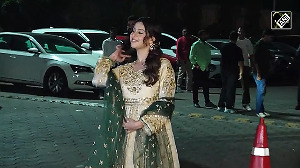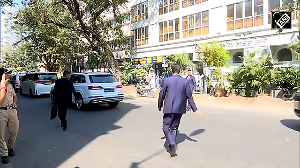"There can be no conflict between modernity and spirituality once control is established over desire," senior monks in the 328-year-old monastery told a visiting PTI correspondent. "We have been using computers to learn Buddhist philosophy and languages like English and Hindi," they said.
Presently, 10 computers have been installed and more will follow. The monastery has infrastructure for providing school education up to eighth standard, and for higher education the monks are sent to Sarnath in Bihar, they said.
Sitting before an imposing nine-metre-high image of Lord Buddha in the shrine, which is the second largest after the one in Lhasa, Samgeleta, a young monk, said he joined the monastery as a bhiksu when he was only nine.
He believes there is no other way than one shown by Buddha to get over the root cause of miseries in life, and has decided to continue his spiritual pursuits as a resident monk of the monastery.
"After 17 years, I still feel I have learnt little of spirituality. Whenever my mind wavers I take refuge in meditation and re-visit the words of Buddha who preached non-violence and desirelessness through self-control as a way of life to get over miseries and attain nirvana," the bespectacled monk in crimson robe said.
Samgeleta said the Tawang monastery was established in 1681 with permission from the fifth Dalai Lama.
In those days people used to contribute in kind and did voluntary services to keep the monastery running. But now there is a corpus fund, whose interest of which takes care of the monastery. However people still keep contributing out of devotion.
In the beginning it was mandatory for every devotee having three or more sons to send the second one to the monastery to become a monk. But over the years rules had been relaxed and people having even four to five sons may not send any, while those having just two sons can send one to the monastery.
There are 465 male residents in the Tawang monastery, perched on a hilltop in the middle of the border town standing like a guardian influencing the lives of the Monpa residents all around.
Officials said the crime rate in the entire district is low and perhaps the spiritual environment has contributed to it. Peace and tranquillity prevails in the town on the Sino-India border, as was evident in the smiling faces of the people.
The locals, under respective society committees, come out in hordes wielding brooms to keep the streets clean and tidy round the year.
The nuns are housed in Bhrama Ane gonpa, Tengachung Ane gonpa and Gyandrong Ane gonpa located within a few kilometres from each other but some distance away from the monastery In-house training centres have also been opened for the benefit of the nuns.
During Buddha Mahotsav, young monks, both male and female, and little 'Buddhas' take out a colourful procession following senior monks which meanders down different lanes from the monastery to the ground below to mark the beginning of the thee-day festival.
As the elderly deliberate, the child monks engage in playful brawls, running after balloons or savouring potato chips from colourful packets.
Monks said residents of the monastery were allowed to watch only news programmes for limited hours on television everyday. The children are allowed to play cricket or football during festivals but care is taken to see that they don't participate in gambling, which are usually organised during festivals.





